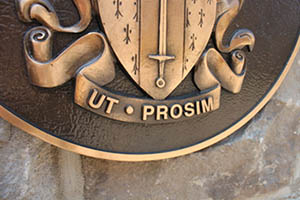Because the patio on the back of my house seems to perpetually be covered in shade, I’ve just finished an hour or two of doing exactly what my wife, doctor and friends have all told me not to do: chipping and shoveling away all the ice.

I mean, I could wait until it melts in late June. But there’s a WonderBeagle who enjoys seeing just how far she can get me moving on the ice, and I don’t wish to fall down out there between now and late spring.
In the course of wrestling this frozen bear, I had to take breaks because – as everyone seems to very much enjoy reminding me of – I’m an old man. It was during one of these breaks I found myself scrolling through Twitter, and two posts caught my eye. One was the fact today is Giving Day at Virginia Tech, and as the name suggests, they want you to give something to the University.
The other involved a younger journalist with a small newspaper here in Virginia. He was mentioning he was using a gift card to buy himself lunch instead of making one because he was too tired from all his long hours at work.
It hit me right in the feels.
I have a complex relationship with journalism these days, because many of the larger publications have turned the profession from a search for the truth to a search for ways to repeat the narrative. Not surprisingly, there are many out there who rank the profession’s popularity right up there with used car salesmen and telemarketers who somewhere during the call say “but wait, there’s more.”
Move to the smaller papers, however, and they remain true to journalism’s original mission. They work long hours, get paid peanuts, and because of constant cutbacks due to lower revenue forecasts, end up juggling the jobs of multiple people instead of just focusing on their own reporting.
Big newspapers are constantly urging you to “support journalism” by paying for a subscription, but when I think of supporting journalism, I think of calling the local newspaper here in Ashburn (the Loudoun Times-Mirror) and sending over a couple of pizzas. When I was that age, I’d have appreciated that more than anything else a reader could do.
Plus when I WAS that age, I received that kind of help. I was working for a weekly called the Blacksburg Sun, and I was the sports editor. We were paid minimum wage at the time, which I think was $1.90 an hour. You may have worked 70 hours a week, but the most you ever were going to be paid was for 40 hours. When you traveled to cover games, you weren’t reimbursed for what you spent, instead getting a per diem, which was a whopping $10 a day.
The food in the press box became your friend. And a means of survival.
During all this, I once got a visit in the press room from Virginia Tech’s Sports Information Director. His name was Wendy Weisend, he’s in the school’s hall of fame, and he had a unique personality. All press boxes had a rule back in the day of “no cheering in the pressbox” and Wendy ruled the Virginia Tech press box with an iron fist. He was a fair man with a heart of gold, but he did not practice in matters of gray. He looked at things for the most part in black and white, and rules, principles and ethics had no in-between.
His greatest talent involved writing, journalism and handling the press, but his second greatest talent may have involved his ability to vocalize obscenities when he was frustrated. For years it was Blacksburg Country Club legend of the time he got stuck in a sand trap, swung his club, yet the ball still remained in the trap. The legend grew over time to the point it was described as the sound of a “thwack” as the club hit the sand, then every obscenity known to man – pieced together in an almost lyrical combination – quickly followed.
I am told eventually the ball was thrown on to the green, and woe be it unto the man who even thought about questioning what Wendy wrote in pencil on the scorecard.
Wendy, to be honest, at times scared the heck out of this then 21-year-old. So as he got closer and closer to me in the press break room, my eyes got bigger and bigger. “What did I do?” my mind kept asking as he finally yelled out “Dave.”
He had heard about my per diem when we were traveling. “Is this true?” he gruffly said. I nodded my head. He then launched into a delightful recitation of all those obscenities that were heard from the sand trap at Blacksbug Country Club, but in this case, they were directed at the owners of the newspaper I worked for.
He then said “listen. That’s not right. From now on when we are on the road, you eat dinner with me and the coaches. Understand?”
Oh, I understood all right. Not only was I going to be eating better, I was also gaining access to a world 21-year-olds with weekly newspapers normally don’t get. “Yes, sir” I answered, and he walked away.
Wendy took this whole deal seriously. I once ordered a hamburger on a road trip and I heard something that sounded a lot like “bulls**t, he’ll have the seafood.” The message was simple: You’re going to eat like the rest of us do.
In the course of life, I’ve found the road leads you in directions that allow you to cross paths with many interesting people, and if you’re lucky, you get to meet wonderful people like Wendy. A simple, kind gesture led to a memory I will never forget, and has caused me many times to repeat. When Virginia Tech talks of “Giving Days” and its motto of Ut Prosim (that I may serve), I always find myself thinking of Wendy and that day he scared the heck out of me in the press room.
So in honor of Giving Day, I’m not donating to the Hokies (although they will get their share down the road). I’m instead sending enough money for a nice lunch to a young man on the other side of the state that I’ve never met. It won’t be the last one either.
Consider it a gift, my younger friend, from Wendy Weisend.
Just don’t order a hamburger ?


